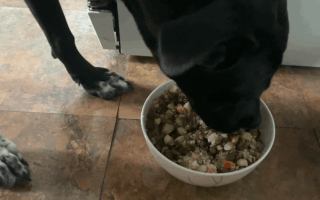If you have a Labrador Retriever in your midst, then you already know that they come from a line of big dogs. But how big exactly do Labradors get? When do they stop growing? How quickly do they grow?
Well, we have answered all these questions and more about your growing Labrador Retriever in this article.
Let’s get to it.
How Big Do Labradors Get?
As a member of a large dog breed, your Labrador Retriever can grow up to 22.5-inches to 24.5-inches tall and weigh 65-80 pounds if they are male. Most female Labs will grow up to 21.5-inch to 23.5-inch tall and weigh 55-70 pounds.
In some cases, a male Lab can even be twice the size of a small female counterpart.
However, not every Lab will be that size. Some puppies will be runts, which means they could be smaller than average when they are adults. There are also times where your Lab could be taller.
Additionally, the weight can greatly vary, especially since Labradors are very hungry dogs.
However, make sure you do not let your Labrador get overweight. Obesity makes your dog more prone to disease and can shorten their lifespan.
How Fast Will My Lab Grow?
Most Labrador puppies will have similar growth patterns. They may have the biggest growth spurt when they are 1-2 months old.
They may gain the most weight when they are 4-5 months old. However, their weight gain usually slows down when they turn 6 months of age.
How Long Will It Take for My Labrador to Be Fully Grown?

There is very little research to let us know exactly when Labradors stop growing. However, there is a lot of evidence that can give us a good idea.
Generally, big dogs grow very slowly because some may take 3 years to fully grow.
In contrast, small breeds often are at their full height when they reach 9 months old.
Consequently, most vets will agree that Labradors stop growing when they are 2 years old, but again, it will vary.
Take note, however, that most Labradors will reach their full height when they are about 9 months old. As they grow a bit more, much of their growth after that will be to fill out their bodies.
Research shows that most Labradors will reach their adult weight when they are one year old. However, another study showed that Labrador Retrievers grow heavier when they are between 1 to 4 years old.
Their increase in weight, then, may depend on whether your dog should be at that weight or if they just eat a lot.
Another thing that you should note is that not all Labs are the same.
They live different lifestyles, eat different food, and live in different environments, among others.
Therefore, your Labrador may not grow as quickly or as slowly as someone else’s.
If I Spay or Neuter My Lab, Will They Still Grow?
Some dog owners worry that if they neuter or spay their Labrador, their canine buddy will stop growing. However, the difference in height is usually very small.
A study showed that there is slightly slower growth if you neuter them after they are 37 weeks old. They showed slightly faster growth if you neuter them before that.
However, the difference is extremely minor, so it would not matter that much.
Can I Estimate My Lab Puppy’s Adult Height and Weight?
It is hard to predict exactly how tall and how heavy your Labrador will grow to be. A veterinarian can give you an estimate, but it may not be accurate.
You can take a look at your Lab’s genetics to see if you can guess how big they will be.
For instance, if your Labrador has two big parents, then there is a chance they will be big and vice versa.
But, what if your Labrador has a large parent and a small parent?
Well, that will be a guessing game from there. They may take on the size of one parent, or even meet in the middle of their parents’ height.
Your dog’s size and weight may also vary, depending on what kind of Labrador they are.
For instance, if you have an English Lab from a show line, they usually have a bigger build. On the other hand, American Labs from working lines are usually smaller.
Keep in mind that external factors other than genes can affect your Labrador’s final weight and height. For example, the amount of exercise that they get and the types and amount of food that they eat will greatly affect how tall and heavy a Labrador will be.
Why Won’t My Labrador Puppy Grow?
Again, not all Labs are the same. Your Labrador can be healthy and still weigh less or more than the average Labs.
However, it would be best to ask a veterinarian about your pet’s height and weight to determine if they are healthy.
As mentioned earlier, the working dog American Labradors are usually smaller than English Labradors. American Labs need to be light and quick for hunting, so being slightly underweight would be fine.
On the other hand, English Labradors are bred to be bigger because they are for show or for visual preferences. Because of this, they often have larger bones and tend to gain weight a bit easier.
If your Labrador has small parents, there is a chance that they will be small. However, puppies from the same litter can still have different heights and weights.
Take note that there are more concerning reasons why your puppy does not grow or why they grow slowly. If your puppy eats the wrong kind of food or does not eat enough, it can greatly stunt their growth, especially when they are young.
So, if you want your Lab pup to grow, you need to consult a veterinarian. Your vet can give you the best diet recommendations and tell you how much your Labrador puppy should eat.
Of course, puppies with illness or that have been ill may have stopped or slowed growth. The height and weight often get more stunted if your puppy had a prolonged illness.
However, if your puppy gets the right diet and care, there is a chance they can grow to their full potential.
If a puppy has been mistreated and neglected, it may also be a reason for their stunted height and weight.
A puppy that was adopted from a bad situation or was stressed often has little to no appetite as well.
All in All
All Labradors are not the same, so they may vary in height and weight. They may also grow differently as a result of different factors.
But as long as your veterinarian says that your dog is healthy, there is nothing to worry about.








